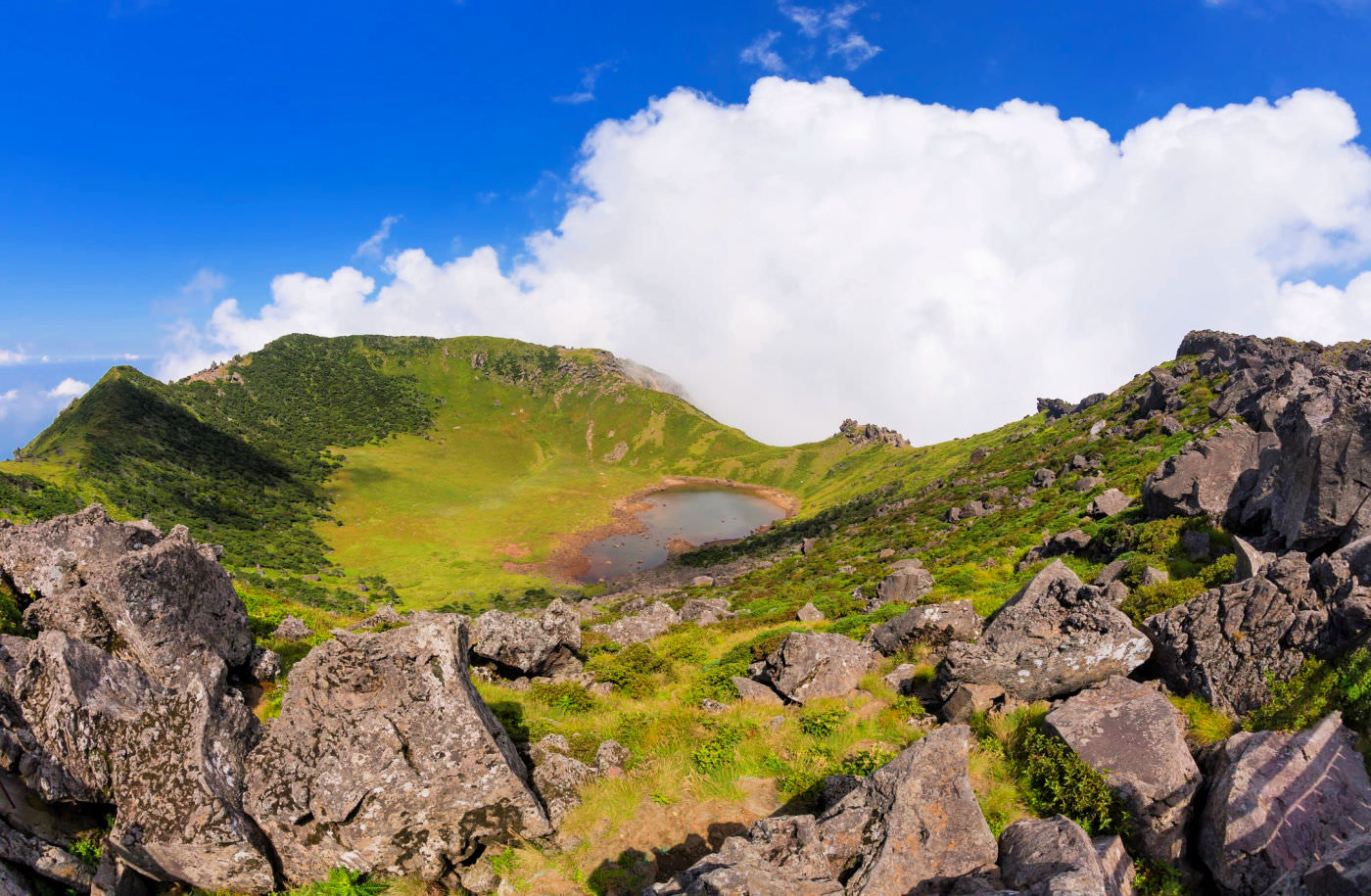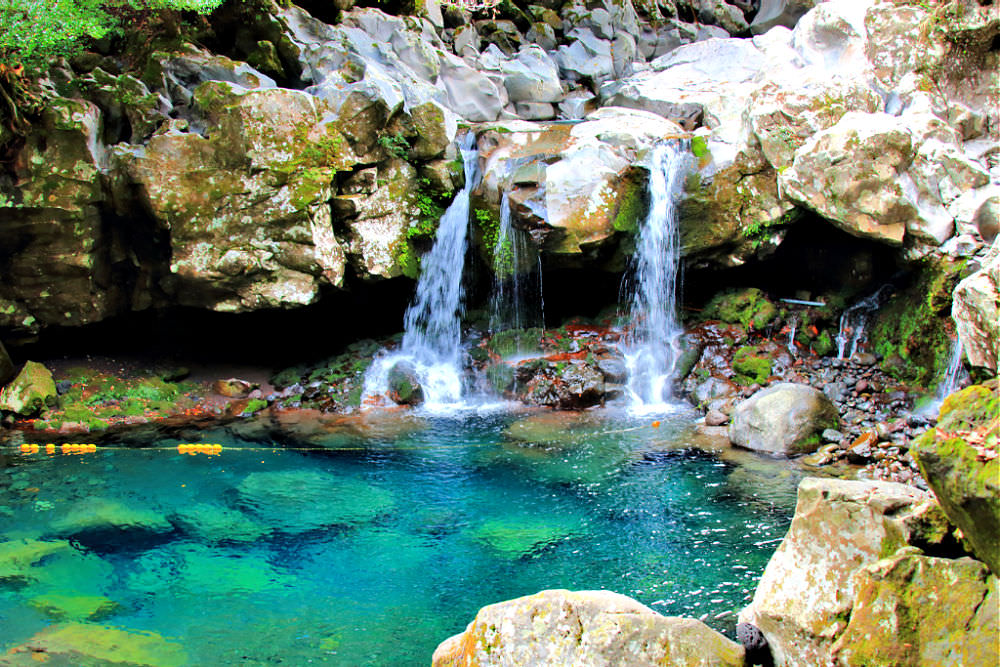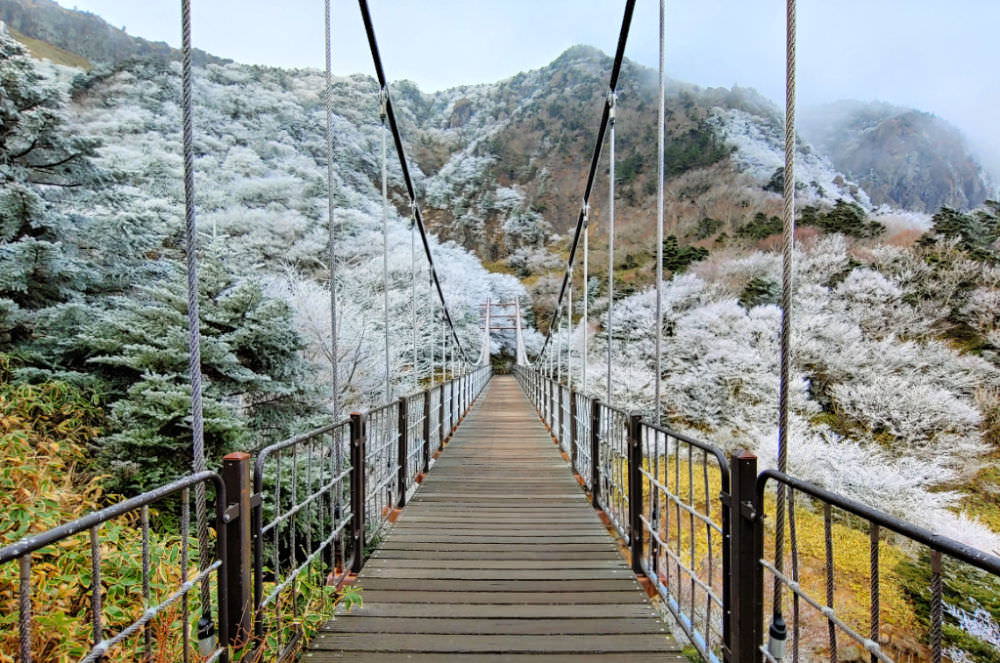Hallasan National Park
on Jeju Island
 A fantastic view from Hallasan National Park of its crater with a small lake area
A fantastic view from Hallasan National Park of its crater with a small lake areaHallasan National Park
Hallasan National Park is a beautiful subtropical park located on Jeju Island, Republic of Korea. The Park is a mountain (a dormant volcano) and the highest one in the country.
Hallasan Mountain shows an attractive and imposing sight at the center of Jeju Island. It is the island's most famous attraction and landmark.
Being on its peak is one of the best experiences you can have when visiting the island. It could also mean that you've climbed the highest mountain and experience its grandeur.
Hallasan National Park has several hiking trails. Most of these trails are created or built so that hikers, both experts, and newbies, can climb to its peak without exerting efforts or draining much energy.
Along the mountainsides and the foot of Hallasan National Park, you can find numerous sorts of attractions, outing facilities, and similar leisure establishments including...
- Parks and Gardens
- Arboretum and conservation facilities
- Farms and fields
- Rest houses, villas, etc.
- Hiking and forest paths
- Museums, art galleries, etc.
Hallasan Mountain Ecosystem
Hallasan (or Halla Mountain; 'san' means a mountain) is also called Yeongjusan Mountain, which means a 'mountain high enough to pull the galaxy.'
Probably, the height, its beauty, and everything in it explains the meaning of that name.
Hallasan, designated as a national park in 1970, has 368 parasitic volcanoes surrounding it called 'oreum,' a local term for a 'peak.'
Due to the height and varying temperatures along its sides, you can find plants that live according to the temperatures they can adapt. It means that the mountainside of Hallasan has a vertical ecosystem.
They say that around 1,800 plant species and over 4,000 animal species, including over 3,000 insect species have been identified.
I guess you wouldn't recognize them all, not even a quarter of them. But you will surely see some of them when you follow one or two of its trails someday.
 Springs and cascades are visible at some areas accessible to hikers at Mount Halla
Springs and cascades are visible at some areas accessible to hikers at Mount HallaHiking Hallasan National Park
Depending on your point of entry towards its peak, Hallasan's trail is relatively easy to accomplish. The longest trail from the entrance to its summit is only about 9 kilometers on a path with mostly easy ascents.
Most hikers, and as recommended by experienced and regular hikers, spend their day climbing up and down in just a day. That's from 9 in the morning and completes it at around 5 in the afternoon.
Briefly, please see the hiking trails below.
Mount Hallasan Hiking Trails
Eoseungsaengak Trail (1.3 kilometers one way)
Eorimok Trail Information Center -- Eoseungsaengak
Seokguram Trail (1.5 kilometers one way)
Chunghon Memorial Site Parking Lot -- Seokguram
Yeongsil Trails (5.8 kilometers one way)
Yeongsil Rest Stop -- Byoengpungbawi (Rock) -- Uitse Oreum -- Nambyeok Point
Donnaeko Trail (7 kilometers one-way hike)
Donnaeko Trail Information Center -- Pyeonggue Shelter -- Nambyeok Point
Gwaneumsa Temple (8.7 kilometers one way)
Gwanemsa Campsite -- Tamna Valley -- Gaemideung -- Samgakbong Shelter -- Dongneung (Summit)
Seongpanak Trail (9.6 kilometers one way)
Seongpanak Trail Information Center -- Sokbat Shelter -- Saraak Oreum Entrance -- Azalea Field -- Dongneung (Summit)
If you want to get to the summit to see Jeju Island from its highest point and the small lake on the crater, you should take either the Gwameumsa Temple Trail or the Seongpanak Trail.
Both trails are popular and usual routes, which most first-timers would take to reach the summit of Hallasan Mountain.
Which one is the best?
They say that following the Seongpanak Trail is the best because it has fantastic views and gentle slopes. The downside is that it's a bit longer.
Others say that the Gwaneumsa Temple Trail of also great because it has excellent views and a bit shorter than Seongpanak.
The good news is that many recommend both trails for a single way. And that you should enter through Seongpanak Trail and come out at Gwaneumsa Temple Trail.
There are two main good reasons...
- hiking up through Seongpak trail is a bit longer but not very steep, and
- hiking down through Gwaneumsa Temple Trail will give a hiker an almost full view of the mountain.
You can find more details here.
 Hanging Bridges at some places are accessible in areas that are very challenging to some hikers.
Hanging Bridges at some places are accessible in areas that are very challenging to some hikers.Accessible Hallasan Facilities
There are numerous resources for hiking activities and other leisures you can find in and around Hallasan National Park. Below are the main facilities you can access, especially when you hike.
- Parking Areas (6 lots are available)
- Campsite (Gwaneumsa Temple area)
- Hiking Trails (and wooden steps, viewing decks)
- Mountain Shelters
- Information Centers
- Shower Room (paid service)
- Restrooms, etc.
Campsite Fee Rates
Small Campsite (maximum of 3 persons): 3,000 KRW
Medium Campsite (maximum of 9 persons): 4,500 KRW
Large Campsite (from 10 or more persons): 6,000 KRW
Getting to Hallasan National Park
You can take public transportations close to the Park. If you are renting a vehicle, you may park it at the Park's designated parking area.
By Taxi
Taking a taxi is the quickest way to get there. From Jeju Intercity Bus Terminal will cost you around 12,000 KRW and take 25 minutes.
By Bus (to Eorimok Trail Entrance)
Take a bus from Jeju Intercity Bus Terminal #740 (travels Yeongsil, Jungmun). Then get off at Eorimok Trail Entrance Bus Stop.
To Gwaneumsa Trail
From Jeju International Airport, take bus #181 to Jeju International
University. Then transfer to bus #475 to Gwaneumsa Trailhead.
From
Jeju City Center, take any of the buses (#281, 181, 426) to Jeju
International University. Then transfer to bus #475 to Gwaneumsa
Trailhead.
From Seogwipo City, take bus #281 to Jeju International University, then transfer to bus #475 for Gwaneumsa Trailhead.
To Seongpanak Trail
By Taxi or Car
You can take a taxi or a rented car to Seongpanak Trail early in the morning to start your ascent. From Jeju Intercity Bus Terminal, it will take about 35 minutes to get there (for around 20,000KRW).
If you're coming from somewhere in Seogwipo City, you pay a bit more due to the distance difference.
By Bus
From Jeju International Airport, you can take bus #181 that travels straight to Seongpanak Trailhead.
From Jeju Bus Terminal, take bus #281 that goes straight to Seongpanak Trailhead.
From Seogwipo City, take bus #182 that goes all the way to Seongpanak Trailhead.
Let me know should you need further details or some clarifications.
- Home
- Jeju Island Attractions
- Hallasan National Park
Get Exciting Activities
Book one of our exciting activities today to experience the thrill of a lifetime! Take advantage of this opportunity and secure your spot in advance.
Hotel Map Guide
Find your affordable, accessible, and comfortable hotel in Seoul at Agoda.Com. See the hotel map below...
Hotel Booking Guide
Find affordable and amazing hotels on Agoda.com using the search box below. Book now to enjoy great discounts and save!







New! Comments
What do you think about this page? Leave me a comment in the box below.